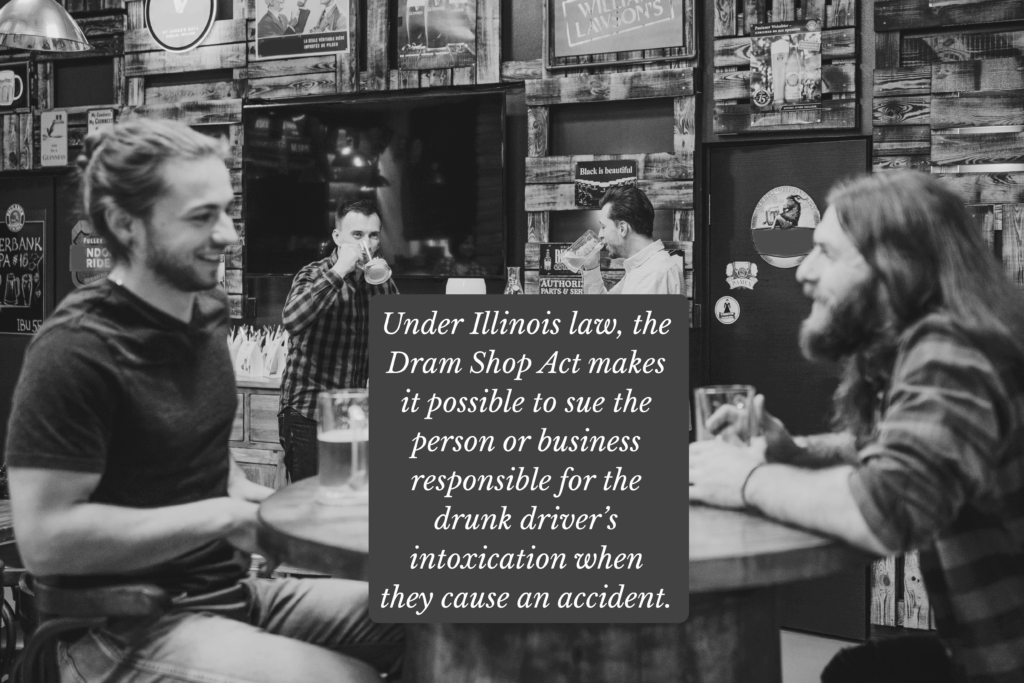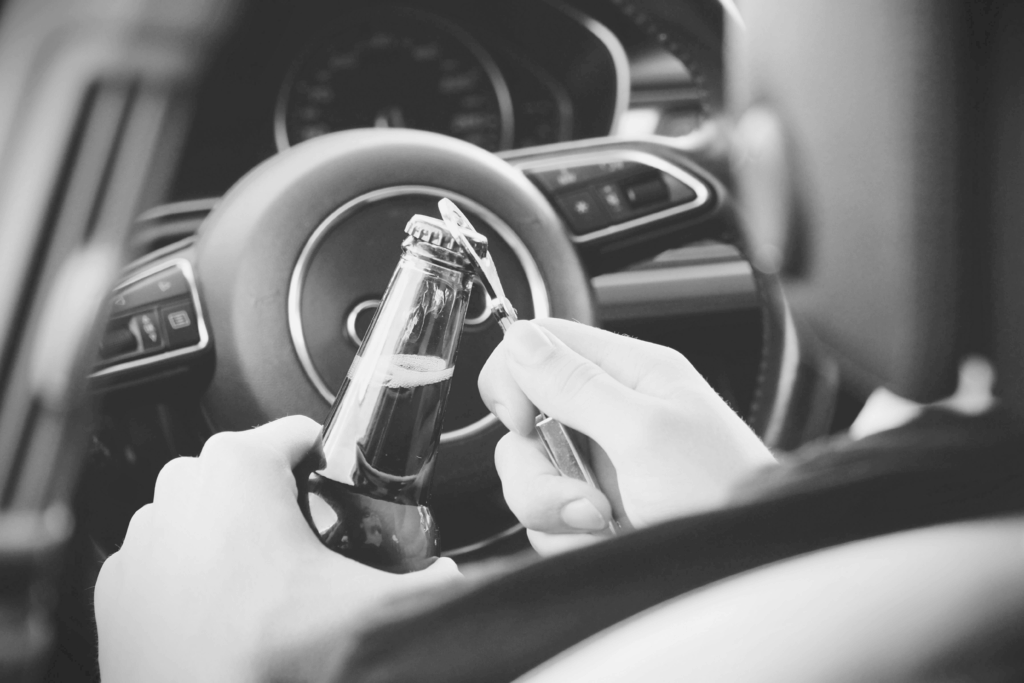Illinois has many peaceful country roads, but unfortunately, drunk driving on rural roads is rampant in this state. A lot of people choose to consume alcohol while going for a joy ride, or decide to drive home after a night at the local tavern — not thinking about the impact it will have if they lose control of their vehicle.
Since nearly half of all alcohol-related deaths occur on rural roads and half of Illinois accidents involve alcohol, it’s important to understand your risks as a driver if you live in rural Illinois. It’s also crucial to know your rights if you or a family member are the victim in a drunk driving accident.
Why is Drunk Driving on Rural Roads So Common?
Rural road conditions pose plenty of challenges even before adding alcohol into the mix. Bad road conditions, slow-moving farm equipment, inadequate lighting, wildlife crossings, and poor visibility due to crops are just a few of the things that cause accidents on country roads. With those hazards already present, motorists who mistakenly assume it’s safe to drink and drive put themselves and other drivers at risk just by getting behind the wheel.
Driving on rural roads poses a high risk of colliding with a drunk driver for these reasons, too:
No Public Transportation Available
In the city, it’s easy for someone to call a cab or order an Uber if they’ve had too much to drink. But in the country, that’s not an option. People find themselves tipsy after leaving a party or a bar, and if there’s no one sober to drive them home, they risk driving drunk.
Two-Lane Roads
Country roads are long, narrow, and winding — and most of them are just two lanes. Passing unsafely or swerving in the wrong direction is all it takes to cross over the center line and cause a head-on collision.
Infrequent DUI Checkpoints
While DUI checkpoints are legal in Illinois, they are usually set up in urban areas where a lot of people are out socializing. Rural areas generally have a smaller police force and fewer resources to conduct roadblocks, and even when checkpoints are conducted, Illinois state law makes it fairly easy for intoxicated drivers to avoid them. The law states that:
- Sobriety checkpoints must be announced ahead of time in a press release or media advertisement.
- Officers must have operational plans for which vehicles to stop. For example, they will stop every third car. They can’t stop every car.
- Stops must be conducted within a reasonable time constraint, such as only from 8 pm to 10 pm.
Furthermore, it is perfectly legal for a drunk driver to take a different route home from the bar or to even make a U-turn before a checkpoint as long as they follow the rules of the road. Considering that an individual will drive drunk an average of 80 times before their first arrest for impaired driving, this puts many innocent victims in danger.
Accidents on Country Roads Cause Devastating Injuries
Due to high speeds and head-on collisions, injuries caused by drunk drivers on rural roads are often very serious. Broken bones, burns, traumatic brain injuries, and spinal cord injuries may require extensive medical treatment and rehabilitation. Some victims may even need long-term or even lifetime care. Some will be out of work for weeks or years.
In addition to physical injuries, the emotional trauma of these crashes can result in post-traumatic stress disorder (PTSD) and other mental anguish. Victims are likely to relive the crash in their heads over and over, or have nightmares about it that affect their sleep quality. They may avoid driving or refuse to even enter a vehicle. Their job performance might be affected due to the inability to concentrate. Children in the accident might not be able to complete their schoolwork.
In many cases, drunk driving accidents on country roads are fatal, causing devastation and heartbreak for the victim’s family.

How Do Drunk Driving Victims Pay for Injuries After an Accident?
Hospital bills, rehabilitation and counseling costs, and/or funeral expenses are very expensive. Families who are already dealing with pain and grief must figure out how to afford it all. Paying for damages and injuries usually begins with one of these scenarios:
The victim’s health insurance. The very first priority is for a drunk driving accident victim to get the medical attention they need. When initially taken to a hospital or seeing a doctor, the patient presents their own proof of health insurance to cover those costs. However, health insurance providers will likely pursue reimbursement through a process called subrogation if the victim later receives a settlement from the at-fault party.
The victim’s MedPay insurance. Medical Payments Coverage (MedPay) is an optional addition through car insurance that pays for medical expenses regardless of who caused the accident. It typically covers medical bills up to a specified limit and is often used for covering deductibles and copayments while waiting for fault determination or reimbursement from the at-fault party.
The drunk driver’s auto insurance. If the drunk driver is insured and is found to be at fault, their insurance company will investigate the accident to determine the extent of the policyholder’s liability. Be aware that they might contact the victim pretending to be compassionate, but they are actually digging for evidence they can use to minimize injuries and pay out less money. Car insurance companies are notorious for lowballing accident victims.
The victim’s uninsured motorist insurance. If the drunk driver doesn’t have insurance or fled the scene, the victim can make a claim under their own uninsured motorist insurance (UM). UM insurance is required in Illinois and can cover:
- Vehicle damage
- Medical expenses incurred for all passengers in the accident
- Wages lost due to inability to work
- Pain and suffering
However, a UM payout will only cover expenses up to the policy limit. For instance, if the UM policy has a $25,000 bodily injury cap and hospital bills add up to $50,000, the victim will still owe the balance.
How an Attorney Can Help Victims Get Compensated
Without legal representation, drunk driving victims usually end up with medical debt and in financial distress. A personal injury lawyer familiar with drunk driving accidents can ensure their clients receive fair compensation to cover current and future expenses. Here’s how our knowledgeable attorneys at Kane Law can help:
Negotiating with the drunk driver’s insurance company
In most cases, insurance companies agree to pay out more when they know an attorney is representing the victim. In addition, our attorneys are skilled at calculating what accident victims are owed. We will take that evidence to the insurance company and write a demand letter stating the:
- Severity of injuries
- Cost of past, current, and future medical expenses
- Lost wages
- Pain and suffering, which are non-economic damages that compensate for physical and emotional distress caused by the accident
- Future medical expenses, including ongoing treatment or rehabilitation
Filing a lawsuit against the driver. If a victim’s expenses exceed what the drunk driver’s insurance company will pay, or the driver didn’t have insurance, our attorneys can help the victim sue the driver. Unfortunately, many drunk drivers don’t have enough assets to cover injuries after a severe accident, and there’s a good chance their savings are being further cut down if they’re spending time in jail.
Filing a Dram Shop lawsuit. Under Illinois law, the Dram Shop Act makes it possible to sue the person or business responsible for the drunk driver’s intoxication when they cause an accident. This can include:
- A licensed alcohol seller, such as the owner of a liquor store, tavern, or restaurant, who sold liquor to a visibly intoxicated person.
- A licensed alcohol seller who served a minor alcohol.
- Any person at least 21 years old who paid for a facility (such as a hotel) where a minor became intoxicated.
Dram Shop Liability limits generally increase every year. As of 2024, the limit is about $85,000 for each injured victim, and nearly $105,000 for family members of those killed or permanently injured in a drunk driving accident.
While You Take Time to Heal, Our Attorneys Will Get the Compensation You Deserve
Drunk driving is common on rural roads and causes tremendous pain for accident victims and their families. If you’re dealing with physical injuries and trauma after an accident, Kane Law’s personal injury attorneys in Effingham, Illinois, can help ensure you get what you are owed. You don’t pay a dime unless you win your case, so contact us today.
Please note that this article was created for advertisement purposes, and it does not constitute any contractual legal relationship, nor imply one.
